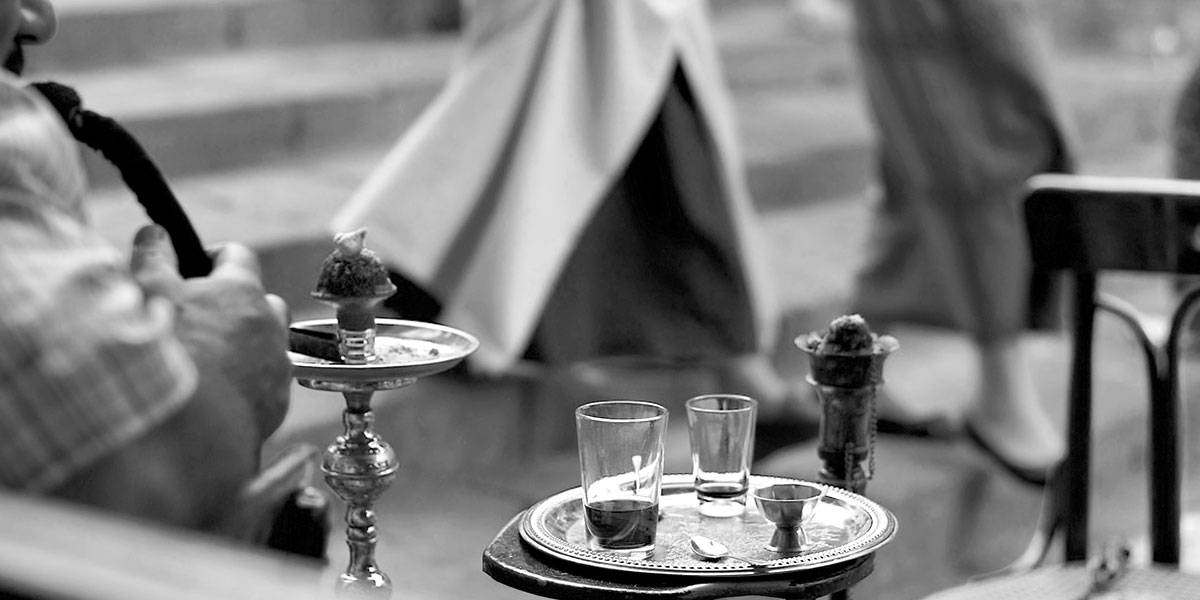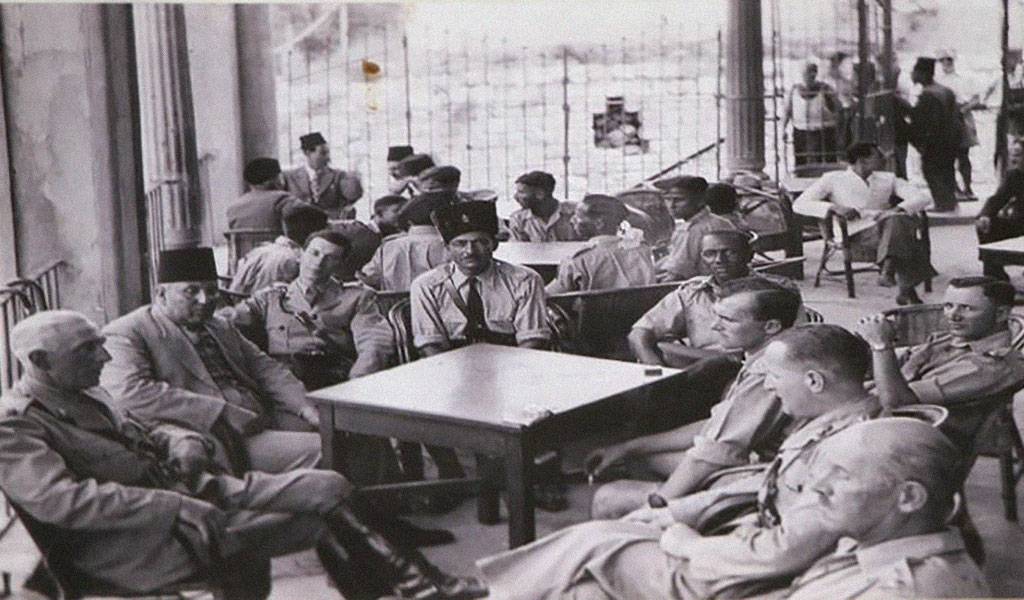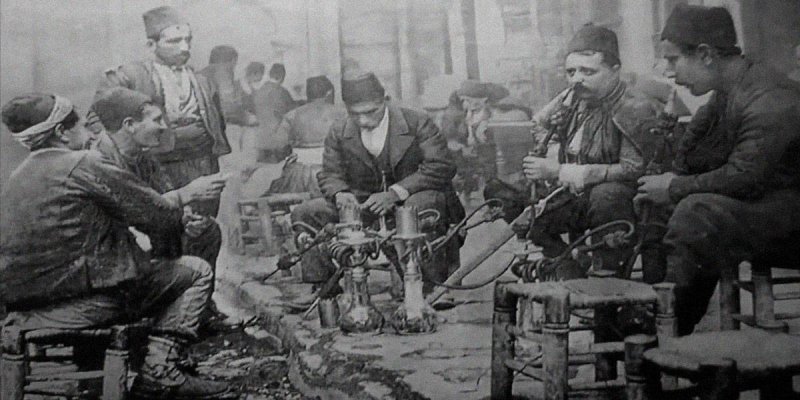How many stories do we tell about coffeehouses? Whether they closed down long ago, or still exist, we hear about this or that person visiting this or that coffeehouse. We recall how a poet wrote a famous poem on its tables, how some political party was founded in one of its corners, or how an intellectual current was born between its walls. We recall how so many interviews with artists, writers, and intellectuals took place there. These stories shape cities and their inhabitants in our memories. After all, coffeehouses do not only serve drinks, they also offer intellect, creativity, and the spirit of those who visit them. This is what makes the journey through the history of the Levant’s (Bilad el Sham) coffeehouses so beautiful.
The coffeehouse
The cafe, or the coffeehouse is that public space where coffee is served and consumed. And coffee, is that drink made from boiling the beans that are believed to have come to the Levant in the 16th century from Yemen. There has been coffeehouses in Damascus ever since there has been coffee there. They quickly became a central part of daily life. During Ottoman times, coffeehouses along with the profession of making coffee traveled north to Istanbul where it is believed that the first coffeehouse was established in 1556 by two people, one from Aleppo and the other from Damascus. It was called “the school of scientists” because it hosted and attracted intellectuals who would come together to drink coffee and converse. In the mid-16th century the Damascene coffeehouse traveled south to Jerusalem with the families that moved there. The city was witnessing an urban expansion during the early period of the Ottoman Empire and many went to settle and work there. In fact in the records of the Jerusalem court one finds the names of many individuals from Damascus whose profession was to make coffee. they were called “Qahwaji”.

Puppets and storytellers
Ever since they exist, coffeehouses were never just serving drinks. The names of coffeehouses are always mentioned whenever there is talk about political, or social life in a country. People go to coffeehouses to exchange stories about their daily lives, and to discuss opinions and thoughts. They have always attracted writers, intellectuals, journalists, painters, and poets. In addition to being a hub of intellectual life, the coffeehouse is also a place of entertainment. In Damascus for instance, but also in other cities, coffeehouses since the beginning of the 17th century started to offer games such as dice, cards, and chess. Soon after, musicians started using them as spaces to perform songs and music on a regular basis. Coffeehouses in Damascus and later in Jerusalem also became famous for storytelling and puppet shows: The hakawati (storyteller) and the karakoz (puppet). One of the most famous shows in Jerusalem was that of Mahmoud the hakawati, originally from the city of Tripoli. Sources say that he used to spend the month of Ramadan in Jerusalem where he would perform every night after Iftar going from one coffeehouse to another until dawn.
Singers of the good old times
At the beginning of the 20th century and after the appearance of the phonograph, coffeehouses started selling recordings and playing music throughout the day. With the spread of coffeehouses in every city, many famous artists started having regular concerts there. In Beirut, the coffeehouses in the Zaytouna area became well known venues for music. One of the most renowned coffeehouses was Mansour where Arab and international bands would perform for patrons. It is also said that by the beginning of the 1940s Assi Al Rahbani who had founded “the Rahbani sons band” with his brother Mansour performed many concerts there as well as in the Sa’ada coffeehouse in the Dora area, and in several coffeehouses in Aley and other Lebanese villages. In the 1950s, Mansour coffeehouse hosted concerts by Mohamed Abdel Mottaleb, Souad Mohammed, Karem Mahmoud, Lore Daccash and others.
Even Um Kulthum and Mohamed Abdel Wahhab sang in coffeehouses during their numerous visits to the Levant. In the early 1920s, the Houmouz coffeehouse in Nablus (established in 1892 and open till today under the management of the third generation of the Houmouz family) hosted both Um Kulthum and Abdel Wahhab in two concerts. On the 9th and 10th of September 1931, Um Kulthum also gave two concerts in the Shanata coffeehouse in Lattakia both lasting from 9pm until dawn. Mohamed Abdel Wahhab also had several concerts in the same coffeehouse between 1930 and 1933.

Where music lovers meet
Today coffeehouses are still spreading in Beirut, Damascus, and in Palestinian cities. Most of them still offer concerts especially by young artists. However, other activities such as storytelling and puppet shows have disappeared or almost. The last of these shows was in Damascus in the Nawfara coffeehouse. Two years ago, the last hakawati, Rashid Al Hallak, known as the “Hakawati of Al Sham” and famous for his folk tales, passed away without anyone to replace him. Next to Nawfara is the Al Bal coffeehouse which opened its doors at the end of the nineties in old Damascus. There, one still hears the voice of Fairuz night and day. And when she performed in Damascus in 2008, her daughter Rima and some of the band members visited the coffeehouse.
The history of coffeehouses in the region is rich with stories that are not limited to what we know about political meetings and intellectual circles. Through them we see the beautiful scenes and the wonderful sounds that existed within their walls. We also hear the voices of their patrons as they spend long nights enjoying the singers, artists, and intellectuals who became some of the most famous names of the 20th century. These public places have played a great role in the intellectual and artistic life of the cities they are in, and were crucial in spreading music and art to people sipping cups of coffee.
Raseef22 is a not for profit entity. Our focus is on quality journalism. Every contribution to the NasRaseef membership goes directly towards journalism production. We stand independent, not accepting corporate sponsorships, sponsored content or political funding.
Support our mission to keep Raseef22 available to all readers by clicking here!
Interested in writing with us? Check our pitch process here!





